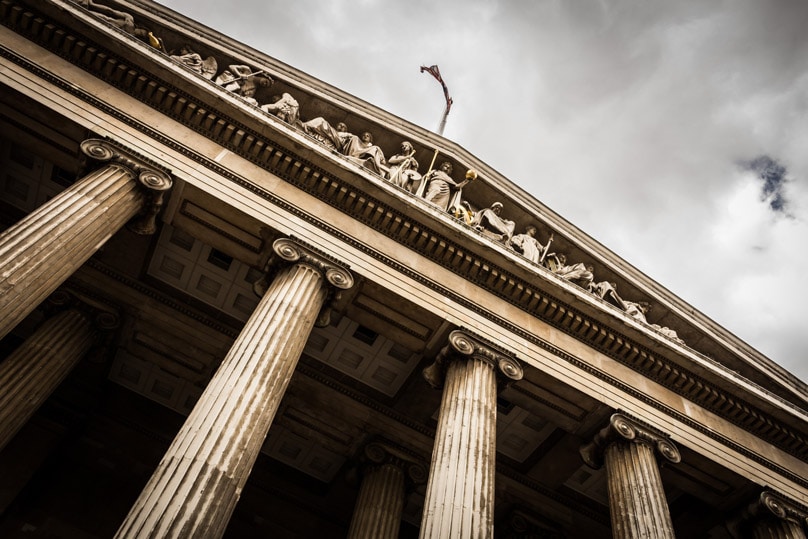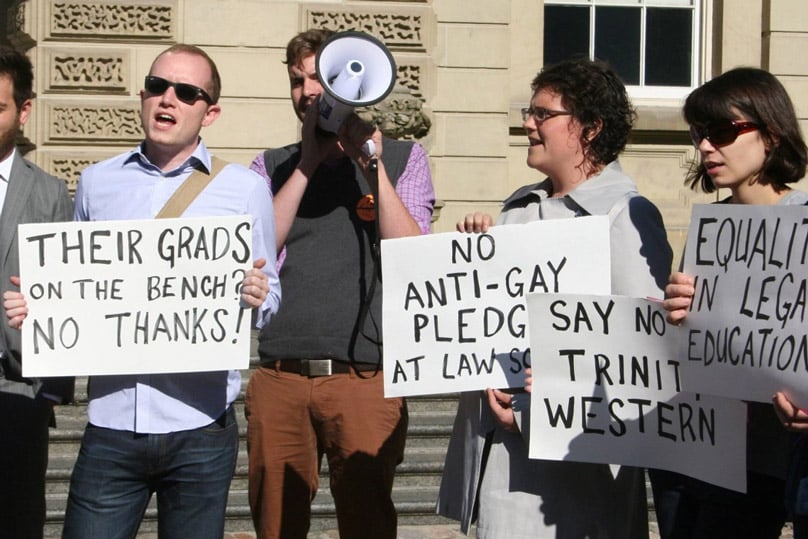
I spent five and a half years studying to get my law degree. I made good friends, enjoyed the subject matter and am grateful for the opportunities it gave me.
But it was also hard work. I read countless pages of textbooks, court judgments and journal articles, prepared long, analytical essays, and studied for more three-hour exams than I would like to remember. And while I enjoyed the study of law, I did the degree so that I could eventually work as a lawyer.
There was no way that I would slog it out for five-and-a-half years if I couldn’t turn my learnings into practice. What does my (or anyone’s) law degree have to do with the marriage debate? Let me explain.
Trinity Western University is a Christian university in Canada (along the lines the Australian Catholic University or the University of Notre Dame Australia.)
Most of the students who choose to attend Trinity Western do so because of its Christian ethos. Like many North American colleges, Trinity Western is residential. Because of this, staff and students are asked to sign a “community covenant” which lists standards of behaviour expected of everyone.
As part of this covenant, among other things, students commit themselves to cultivating Christian virtue, to treat all persons with respect and dignity, and to take responsibility for their choices and how they impact others. They also undertake to abstain from gossip and lying, from cheating and stealing, from pornography, drunkenness, and drug use.

While a difficult ask, one can imagine that – if kept – the community covenant would make from a pretty exceptional university environment, so starkly contrasted to the reports we hear coming out of so many American universities today.
The staff and students also undertake to abstain from sexual intimacy that violates the sacredness of marriage between a man and a woman: so, no pre-marital sex and no homosexual sex. It is that promise – the one which relates to their personal choices about their own, personal sex life – that has come under scrutiny and that has me thinking about my own law degree.
After finishing their degree, a law graduate needs to be admitted to practise law. It’s not enough to have the degree, you need to do a handful of practical, post-graduate subjects and get some work experience before getting your lawyer’s license (what we call a ‘practising certificate.’)
Because of the promise about sexual activity made in their community covenant, law graduates from Trinity Western are not eligible for a practising certificate in certain parts of Canada.
The Law Society of Upper Canada has deemed that making a personal decision to reserve sexual intimacy for heterosexual marriage makes a person unfit to be a lawyer.

The Law Society does not object to the academic program from Trinity Western, or the abilities of the students, but it has a problem with their character: believing that marriage is between a man and a woman and choosing to live in accordance with that belief is now a disqualifying factor for the practice of law.
The university sought assistance with the courts, but the Ontario Court of Appeal sided with the university, saying that the community covenant discriminated against LGBTIQ persons.
Just let that sink in – making a personal decision about who I will or will not have sex with is now somehow relevant to whether or not I am eligible to practise law in Canada.
My friends, these are the fruits of same-sex marriage, being borne in a society that redefined marriage just over a decade ago. Don’t let anyone sell you the proposed change in law under the banner of “live and let live.” There is nothing “live and let live” about this ideology. It is “comply – or be cast out.”
You might tell me that this would never happen in Australia; that somehow, we will be able to quarantine this type of lunacy to the northern hemisphere.
But just last month, the Law Society of New South Wales, of which I am a full-paying member and on which I rely for my ability to practise as a lawyer, issued a statement calling for the legalisation of same-sex marriage law.
The opinions of members were not sought on this matter, and those in charge are unwilling to retract or modify their backing of this position. I am now in official and public disagreement about same-sex marriage with the body that has the ability to allow me to decide whether or not I get to practise law in this State.
If the law was to change, I do not like my chances of getting issued a practising certificate in future years.
Similar statements about same-sex marriage have been made by bodies such as the Australian Medical Association, the Australian Psychological Society and the NSW Nursing and Midwives Association.
Professionals in these industries and others risk professional consequences if they object to same-sex marriage. The only way to protect freedoms is to vote “no.”
